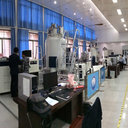Polydatin Protects Diabetic Heart against Ischemia-Reperfusion Injury via Notch1/Hes1-Mediated Activation of Pten/Akt Signaling.
Keywords
Abstract
Diabetes exacerbates oxidative/nitrative stress during myocardial ischemia-reperfusion (MI/R) injury. Recent studies highlighted the cardioprotective actions of polydatin. However, its effect on diabetic MI/R injury and the underlying mechanisms remain unknown. This work was undertaken to evaluate the effect of polydatin on diabetic MI/R injury with a focus on Notch1/Hes1 signaling and myocardial oxidative/nitrative stress. Streptozotocin- (STZ-) induced diabetic rats were administered with polydatin (20 mg/kg/d) in the absence or presence of DAPT (a γ-secretase inhibitor) or LY294002 (a PI3K/Akt inhibitor) and then subjected to MI/R injury. Polydatin administration preserved cardiac function and reduced myocardial infarct size. Moreover, polydatin ameliorated myocardial oxidative/nitrative stress damage as evidenced by decreased myocardial superoxide generation, malondialdehyde, gp91 phox expression, iNOS expression, NO metabolite level, and nitrotyrosine content and increased eNOS phosphorylation. However, these effects were blocked by DAPT administration. DAPT also inhibited the stimulatory effect of polydatin on the Notch1/Hes1-Pten/Akt signaling pathway in a diabetic myocardium. Additionally, LY294002 not only abolished polydatin's antiapoptotic effect but also reversed its inhibitory effect on myocardial oxidative/nitrative stress. Polydatin effectively reduced MI/R injury and improved left ventricular functional recovery under diabetic condition by ameliorating oxidative/nitrative stress damage. Importantly, Notch1/Hes1-mediated activation of Pten/Akt signaling played a crucial role in this process.






